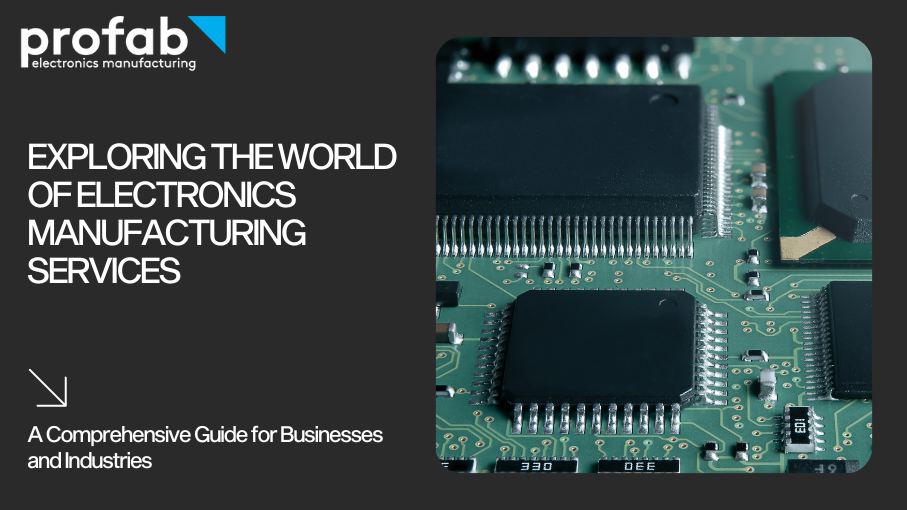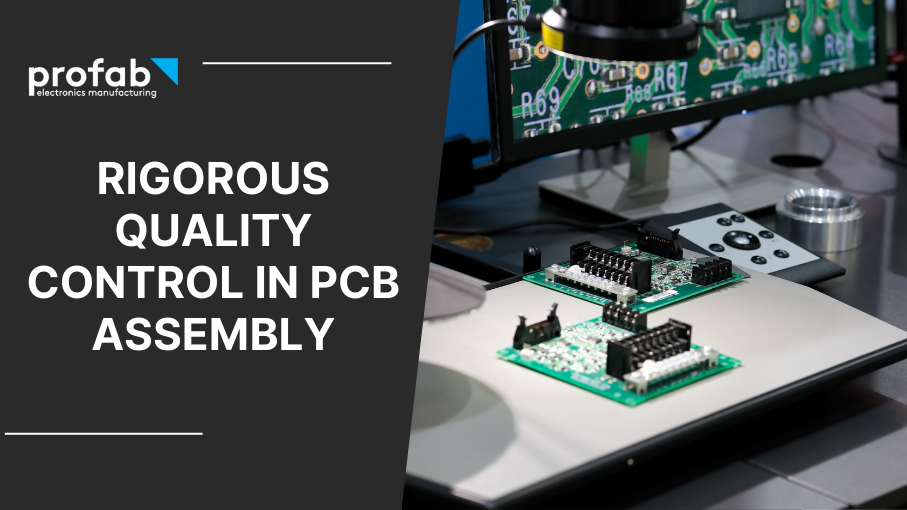
Exploring the World of Electronics Manufacturing Services
Understanding the Role and Impact of Electronic Manufacturing Services in Today's Technology-Driven Economy
Defining Electronics Manufacturing Services (EMS)
Electronic Manufacturing Services (EMS) is a term used to describe companies that design, manufacture, test, distribute, and provide after-sales services for electronic devices and assemblies. These services are provided to Original Equipment Manufacturers (OEMs) in various industries, such as automotive, consumer electronics, telecommunications, medical, and aerospace, among others. EMS companies enable an original equipment manufacturer to focus on their core competencies, such as product development and marketing, while outsourcing the manufacturing and other related services to a qualified electronic manufacturing provider.
Importance of EMS in Today's Global Market
The electronics manufacturing industry plays a vital role in the global economy, with electronics being fundamental to almost every aspect of modern life. EMS companies have become an essential part of this industry, helping organizations stay competitive, manage increased complexity, and capitalize on innovation. The continued growth and expansion of these services, fueled in part by the evolving needs of businesses and the rapid pace of technological advancements, have helped create a dynamic and diverse market for electronic manufacturing companies.
Overview
This article provides an in-depth look into the world of electronics contract manufacturing services, outlining the various types of services offered, the manufacturing process, key trends and challenges, as well as factors to consider when choosing an electronics manufacturing services provider. The content is tailored for professionals in the electronic manufacturing industry, business decision-makers involved in outsourcing electronic manufacturing services, or individuals interested in learning more about this essential aspect of the global economy.
EMS and Original Equipment Manufacturers (OEM)
Differences and Relationship between EMS and OEM
Original equipment manufacturers (OEMs) are companies that design and develop products for their specific brand, such as cell phones, laptops, and other electronic devices. In contrast, electronics manufacturing service (EMS) companies offer manufacturing, testing, and assembly services on behalf of these OEMs for their circuit boards.
The relationship between electronics contract manufacturing companies and OEMs is symbiotic: electronic manufacturing companies benefit from the continued demand for production services while the OEMs can benefit from the expertise and efficiencies offered by outsourcing their electronic manufacturing and streamlining their procurement process .
Roles and Responsibilities of EMS and OEM
OEMs are responsible for designing and engineering their products and defining the specifications for production. They may also market and distribute their products to end-users. In contrast, electronics manufacturing companies are responsible for interpreting these specifications and producing the products in accordance with the OEM’s requirements. This includes procuring components, assembling and testing the products, and managing logistics for shipment and delivery.
EMS Companies vs. In-house Manufacturing
Some OEMs choose to manufacture their products in-house, while others outsource their manufacturing needs to an EMS company. The benefits of outsourcing include reduced capital investment in facilities and equipment, increased flexibility, and access to a highly specialized workforce. On the other hand, in-house manufacturing allows for greater control over the production process and potential for IP protection.
Electronics Manufacturing Services Offered
Printed Circuit Board Assembly (PCBA) Services
PCBA services involve the assembly of electronic components onto a printed circuit board (PCB). This includes processes such as soldering, placing components, and testing the assembly to ensure it meets quality and performance standards. Electronics manufacturing providers may offer both manual and automated assembly processes depending on the complexity and volume of the project.
Supply Chain Management
Electronics manufacturers manage the procurement and supply of electronic components from various material suppliers, ensuring that the right components are delivered at the right time to meet production schedules. This often involves supplier evaluation, negotiation, and ongoing performance monitoring. Effective supply chain management can help reduce costs, minimize lead times, and ensure the availability of components.
Testing and Quality Assurance
Quality assurance is a critical aspect of any manufacturing process. Electronics manufacturers typically offer testing services at various stages of the production process, including in-circuit testing, functional testing, and environmental stress testing. These tests help ensure that the final product meets the specifications set by the OEM and performs as expected in its intended environment.
Prototyping and Design Services
Some EMS providers offer prototyping and design services, helping original equipment manufacturers refine their product designs and ensure manufacturing feasibility. This can involve creating a small number of pre-production units for evaluation, troubleshooting, and final design validation before moving to mass production.
Reverse Engineering and Repair
Reverse engineering involves analyzing a finished product to deduce its design and manufacturing processes. EMS providers may offer this service to help OEMs improve their products or troubleshoot issues. In addition, EMS companies may provide repair and refurbishment services, often as part of their after-sales support.
The Electronics Manufacturing Process
Design and Development
The design and development phase involves OEMs creating the specifications and design files for their products. This typically includes the creation of schematics, bill of materials (BOM), and PCB layout files. The OEM may consult with the EMS provider during this stage to ensure the design is optimized for manufacturability, and any potential issues are identified and resolved early.
Component Procurement
EMS providers are responsible for sourcing the electronic parts required for the manufacturing process. OEMs can reduce substantial fixed costs by relying on electronics manufacturing companies to source components especially during times of supply chain shortages creating global electronics manufacturing challenges for the entire industry. This involves identifying suppliers, negotiating prices, managing lead times, and ensuring quality and authenticity. In some cases, the OEM may provide specific component suppliers or even supply the components themselves.
Assembly and Production
During the assembly and production stage, the EMS provider will manufacture the product according to the OEM’s specifications. This can involve a range of processes, such as PCB assembly, soldering of components, and integration of sub-assemblies into the final product. The production process may be carried out using manual or automated methods, depending on the complexity and volume of the project.
Quality Control
Quality control is critical to ensure the final product meets the specifications set by the OEM and performs as expected in its intended environment. An EMS provider may employ a variety of testing methods, including in-circuit testing, functional testing, and environmental stress testing, to verify the quality and performance of the product at various stages of the production process.
Distribution and Logistics
Once the products have been manufactured and tested, EMS providers may handle the shipment and delivery of the products to the OEM, or directly to end customers. This can involve managing the logistics of transportation, warehousing, and distribution, as well as any required customs clearances and compliance documentation.
EMS in Different Industries
Consumer Electronics
Consumer electronics is a rapidly evolving market, driven by continuous innovation and increasing consumer demands for advanced technology. The electronic contract manufacturing services industry plays a crucial role in supporting the development and production of various consumer electronics, such as smartphones, laptops, and home appliances. EMS providers enable OEMs to bring new products to market more quickly and efficiently by leveraging their specialized manufacturing capabilities and supply chain expertise.
Automotive Industry
The automotive industry has been undergoing significant transformation, with increased demand for electric vehicles, autonomous driving technologies, and advanced in-car infotainment systems. EMS providers can support the automotive industry by manufacturing electronic components and systems required for these advanced technologies, such as battery management systems, sensors, and control units.
Medical Devices
Medical devices, ranging from simple diagnostic tools to sophisticated surgical instruments, often require highly specialized manufacturing processes and stringent quality control measures. EMS providers can offer tailored services for the manufacture of medical devices, ensuring adherence to industry regulations and maintaining the necessary quality standards.
Telecommunications
In the telecommunications industry, EMS providers can support the production of infrastructure equipment, such as base stations, routers, and switches, as well as end-user devices like modems and smartphones. These products often require advanced manufacturing technologies and rigorous testing to ensure reliable performance and durability.
Aerospace and Defense
The aerospace and defense industries demand high levels of reliability, precision, and quality from their electronic components and systems. EMS providers can offer specialized manufacturing capabilities, materials, and testing procedures to meet the stringent requirements of these industries, from satellite communications systems to guidance and control equipment.
Key Trends in Electronics Manufacturing Industry
Industry Outlook and Growth Projections
The global EMS market is expected to grow at a steady pace, fueled by increasing demand for electronic products across various industries and the continued expansion of emerging markets. Technological advancements, such as the Internet of Things (IoT) and 5G connectivity, are also expected to drive demand for advanced electronics manufacturing services.
Technological Developments
Advancements in automation, robotics, and artificial intelligence are transforming the electronics manufacturing landscape, resulting in increased efficiency, reduced costs, and improved quality control. The adoption of Industry 4.0 technologies and smart manufacturing techniques will likely continue to influence the EMS industry, enabling providers to meet the evolving demands of their customers.
Environmental Sustainability and Green Manufacturing
As sustainability and environmental concerns take center stage, the EMS industry is increasingly focused on adopting green manufacturing practices and using eco-friendly materials. By reducing energy consumption, minimizing waste, and recycling electronic components, EMS providers can contribute to the development of sustainable electronics value chains and enhance their brand image among environmentally conscious customers.
Challenges in Electronics Manufacturing
Supply Chain Disruptions
The EMS industry relies on a complex global supply chain for the provision of electronic components and materials. Supply chain disruptions, such as natural disasters, political tensions, or logistical bottlenecks, can significantly impact production schedules and lead to increased costs. EMS providers must develop contingency plans and maintain strong relationships with their suppliers to minimize the impact of such disruptions.
Material Shortages
The electronics industry is experiencing increasing demand for key materials, such as semiconductors, rare earth elements, and specialty chemicals. These shortages can lead to increased costs and longer lead times, impacting the ability of EMS providers to meet their customer’s production requirements. Diversifying sources and implementing effective procurement strategies can help mitigate these challenges.
Regulatory and Compliance Issues
Electronics manufacturing services providers must adhere to a range of regulations and standards, such as RoHS (Restriction of Hazardous Substances), REACH (Registration, Evaluation, Authorisation and Restriction of Chemicals), and industry-specific certifications. Navigating these regulatory requirements can be complex and time-consuming, particularly for providers serving multiple industries and geographies. EMS companies must ensure compliance with all applicable regulations to maintain their market reputation and avoid potential fines or penalties.
Global Political and Economic Upheavals
Geopolitical events, such as trade wars, tariffs, and economic sanctions, can significantly impact the global electronics manufacturing industry. EMS providers must remain agile and adaptive in the face of such uncertainties, adjusting their strategies and operations to minimize disruption and maintain competitiveness.
High Mix Low Volume Manufacturing
Benefits and Challenges
High mix low volume (HMLV) manufacturing refers to the production of a wide range of products in relatively small quantities. This approach allows EMS providers to be more responsive to changing customer demands, support the development of niche products, and reduce inventory costs. However, it also presents unique challenges, such as increased complexity in production planning, higher set-up costs, and a greater need for skilled labor and flexible production processes.
Adapting to Customer Needs
EMS providers offering HMLV manufacturing must adapt their processes and capabilities to better serve their customers' evolving needs. This may involve investing in advanced production equipment, implementing agile manufacturing processes, and developing strong engineering expertise to manage the increased complexity of HMLV projects.
Implementing Flexible Manufacturing Processes
To succeed in HMLV manufacturing, EMS providers must implement flexible production processes that can accommodate rapid changes in product requirements and schedules. This could include modular production lines, lean manufacturing principles, or quick changeover procedures to minimize downtime between production runs and optimize efficiency.
Factors to Consider when Choosing an EMS Provider
Technical Capabilities
When selecting an EMS provider, it is essential to assess their technical capabilities to ensure they can meet the specific requirements of your project. This may involve evaluating their expertise in PCB assembly, testing services, and any specialized manufacturing processes required for your product.
Expertise and Reputation
The provider's industry reputation and track record should be considered when making a decision. Investigate their experience in serving your industry and other similar projects, as well as feedback from their existing customers, to determine if they can deliver the level of quality and service you require.
Pricing and Payment Structures
Evaluate the provider's pricing and payment structure to make sure it aligns with your organization's financial requirements. This may include factors such as upfront costs, ongoing fees for services, or any potential discounts for long-term partnerships.
After-sales Support and Warranty
Ensure that the EMS provider offers adequate after-sales support and warranty services to address any issues that may arise during the product's lifecycle. This can include repair or refurbishment services, as well as ongoing technical support.
The Future of Electronics Manufacturing Services
Industry 4.0 and Smart Manufacturing
The ongoing adoption of Industry 4.0 technologies and smart manufacturing techniques is reshaping the EMS landscape. Providers must continually innovate and invest in advanced production capabilities, such as automation, robotics, and AI, to stay competitive and meet the evolving demands of their customers.
The Role of Automation and Robotics
Automation and robotics have the potential to greatly enhance the efficiency, precision, and quality of electronics manufacturing processes. EMS providers must continue to explore and adopt these technologies, both to remain competitive and to address the increasing labor shortages and rising wages in key production regions.
The Impact of AI and IoT
Artificial intelligence (AI) and the Internet of Things (IoT) are expected to play pivotal roles in shaping the future of electronics manufacturing, enabling the development of predictive maintenance, real-time process optimization, and advanced quality control techniques. EMS providers must stay at the forefront of these technological developments to maintain their competitive edge in the industry.
Reshoring and Local Production Trends
There is a growing trend towards re-shoring and localization of electronics manufacturing, driven by factors such as increasing labor costs in traditional production regions, political uncertainties, and concerns over supply chain disruptions. Electronics companies must adapt to these trends and consider opportunities for expanding their presence in key markets or developing partnerships with local providers.
Conclusion
Summing Up the Importance of EMS
The electronics manufacturing services industry plays an essential role in supporting the growth and development of today's global economy. By providing a comprehensive range of services and expertise, EMS providers enable organizations to bring innovative, high-quality products to market more quickly and efficiently than ever before.
Preparing for the Future of EMS
As the electronics manufacturing landscape continues to evolve, both EMS providers and their customers must remain agile and adaptive, recognizing new opportunities and challenges as they arise. This may involve embracing new technologies and manufacturing approaches or adapting to shifting market trends and regulatory requirements.
Adaptability and Innovation as Keys to Success
Ultimately, the continued success of the EMS industry will depend on its ability to adapt to a rapidly changing global market, embrace technological advancements, and maintain a relentless focus on innovation and customer service. By doing so, EMS providers will not only be better positioned to support the continued growth of today's electronics industry but also help shape the future of electronics manufacturing worldwide.
About Profab Electronics
Profoundly embedded in the electronics manufacturing sector, Profab Electronics has been steadfast in its commitment to deliver excellence for over three decades. Our unparalleled experience, fortified by our stringent quality standards, positions us as a trusted partner in the realm of Electronics Manufacturing Services (EMS).
We're an ISO 9001 and AS9100 certified company, and our adherence to these globally recognized standards attests to our unyielding quest for quality. Our team comprises experts who hold formative training on the latest IPC standards, ensuring that we consistently produce electronic products of the highest caliber.
Our proficiency lies in PCB assembly, offering a spectrum of services ranging from Surface Mount (SMT) to Through-Hole Assembly. From the initial stages of prototyping to high volume pcb assembly, we offer comprehensive solutions to meet client requirements.
At Profab Electronics, we synergize our expertise and experience to deliver high-quality electronic products. Our unwavering commitment to quality, innovation, and customer satisfaction has established Profab Electronics as a leader in the electronics manufacturing industry. Trust us to bring your technological visions to life.
Latest Posts

Learn about our state-of-the-art Surface Mount and Through-Hole Technologies, sophisticated soldering processes, and rigorous quality control methods that define today's industry standards.

Learn about our advanced component placement, solder paste printing, and automated inspection systems that revolutionize the assembly process.

Discover how our adherence to ISO 9001 and AS 9100 standards, IPC solder training, and meticulous inspection processes ensure the precision and accuracy of every PCB we produce, underpinning our unwavering commitment to quality.